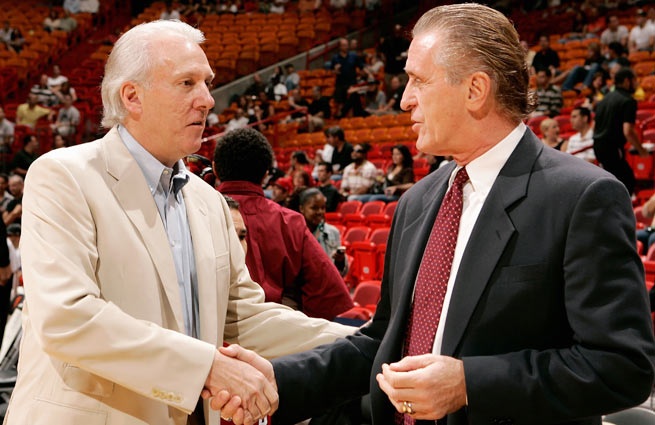Gregg Popovich and the San Antonio Spurs, it seems, owe Miami Heat president Pat Riley some sort of assorted wine and cheese and movie gift basket.
It’s slightly because of him that LaMarcus Aldridge decided to leave the Portland Trail Blazers, spurn overtures from the Phoenix Suns and Dallas Mavericks, among others, and sign in San Antonio.
Seriously.
Yahoo Sports’ Adrian Wojnarowski published a detailed piece about Aldrige’s trip through free agency this past summer. The entire thing is worth a read, as it provides excellent insight into the inner-workings of the NBA’s offseason pageant, as well as Aldrige’s thought process through each meeting. But something near the end stood out:
So, Popovich climbed on a flight and headed back to Los Angeles. But before Popovich and Aldridge would meet on July 3, the greatest recruiter of them all, Miami president Pat Riley, had persuaded Aldridge to take a dinner with him on the evening of July 2. How could Aldridge resist? Who didn’t want to be wooed by Riley? If nothing else, he had to hear him out.
The Heat didn’t have the salary cap space to sign Aldridge, and Riley’s wish for Aldridge to sign a one-year deal with Portland and wait for the Heat’s space in 2016 was a most unappealing proposition. Nevertheless, Riley made a case to Aldridge that turned out to be an immense blessing for the franchise that had obliterated the Heat in the 2014 NBA Finals. As the idea of joining the Suns gained real momentum, Riley’s message would go a long, long way toward validating the Spurs’ cause. Truth be told, Riley’s words resonated as deeply with Aldridge as anyone’s in the process.
“He told me, ‘You’re a good player, but you can be great,’” Aldridge told Yahoo. “I’ve had good seasons on my own, but to win, you’ve got to have other big-time guys with you. When you have other guys who are willing to take that sacrifice with you – maybe you all go from averaging 23-24 points to 18-19 points – and you can all do it together.
“He was saying, ‘Hey, you might have to take a lesser role, but at the end of the day, you want to be known as a champion. Champions have to do different things.’ He brought up Chris Bosh, how he was averaging 21 in Toronto, and came to Miami, and people tried to say he wasn’t important. He told me, ‘We don’t win any of those championships rings without him,’ [and] that [Bosh] wouldn’t trade those rings for anything.
“Eventually, it becomes a road in your career, whether you have to decide whether you want to keep having these crazy stats, or do you want to win a championship?”
On the night of July 2, with Popovich returning for a lunch meeting the next day, Riley had delivered an unintended assist to the Spurs. He had turned Aldridge’s mind back toward San Antonio, setting the stage for Popovich to close the deal. “Yeah, the things [Riley] said were definitely more positive for me coming to San Antonio,” Aldridge told Yahoo.
This settles it. Riley really is the free-agent whisper.
Not only did he land a meeting with a free agent he couldn’t afford, just so he could ask the free agent to sign a one-year deal and risk future money just in order to wait on him, but he guided Aldridge in an entirely different direction.
Yes, Aldridge told Wojnarowski about how impressive and persuasive the Spurs were. But the prevailing theme throughout most of the piece was Aldridge’s unwillingness to cede too much status, to be anything less than the face of a franchise. He asked teams to sign DeAndre Jordan or Tyson Chandler, because that would help their chances. He had general manager Neil Olshey and the Blazers wrapped around his finger, ready and willing to do whatever he wanted.
In the end, though, he chose the franchise that, point blank, told him it would never devote a bulk of its attention, of its planning, to one player. He sacrificed touches. He conceded status. And maybe that’s what he would have always done.
Or maybe, just maybe, Riley reached Aldridge on a level no one else could, inadvertently steering him into San Antonio’s, searching for everything the free-agent whisperer had laid out before him but couldn’t personally give him.


















